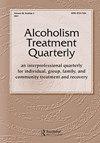microrna在酒精相关性肝病中的作用
IF 0.9
Q4 SUBSTANCE ABUSE
引用次数: 0
摘要
酒精相关性肝病(ARLD)是世界范围内最常见的慢性肝病,也是最严重的健康问题之一。每天饮酒超过40克的人会患上酒精性脂肪肝(AFL)。AFL进展为酒精性脂肪性肝炎导致ARLD。氧化应激、炎症反应、遗传和表观遗传因素等危险因素可能解释ARLD发病机制的巨大差异。ARLD患者的诊断包括评估酒精使用障碍和晚期肝脏疾病的体征。由于早期发现和治疗失败,越来越多的晚期ARLD患者被观察到。戒酒、营养治疗和皮质类固醇是所有阶段ARLD的最佳治疗方法。针对IL-22/STAT3、TNF受体超家族、抗氧化信号、LPS、炎性小体、激素和microrna的治疗作为转化研究用于ARLD的治疗。microrna是非编码rna,主要参与ARLD的发生和发病机制。本文综述了在ARLD中参与氧化应激、表观遗传调节和炎症反应的microRNAs的异常调控作用,并重点讨论了microRNAs在肝纤维化、肝硬化和肝细胞癌等肝脏疾病不同阶段的潜在机制。本文章由计算机程序翻译,如有差异,请以英文原文为准。
Role of MicroRNAs in Alcohol-Related Liver Disease
Alcohol-related liver disease (ARLD) is the most prevalent type of chronic liver disease and one of the most serious health problems worldwide. Individuals consuming more than 40 g of alcohol per day can develop alcoholic fatty liver (AFL). Progression of AFL to alcoholic steatohepatitis leading to ARLD. The risk factors such as oxidative stress, inflammatory response, and genetic and epigenetic factors might explain considerable variation in ARLD pathogenesis. Diagnosis of patients with ARLD involved assessing alcohol use disorder and signs of advanced liver disease. Increasing number of patients with advanced stages of ARLD is observed due to failure in early detection and treatment. Alcohol abstinence, nutritional therapy and corticosteroids are the best treatment for all stages of ARLD. Therapies targeting IL-22/STAT3, TNF receptor superfamily, antioxidant signal, LPS, inflammasomes, hormones and microRNAs are used in treatment of ARLD as translational research. MicroRNAs are non-coding RNAs mainly involved in underlying mechanisms of development and pathogenesis of ARLD. The current review summarizes the role of aberrant regulation of microRNAs involved during oxidative stress, epigenetic modulations and inflammatory response in ARLD and also focused on the underlying mechanism of microRNAs in different stages of liver diseases such as liver fibrosis, liver cirrhosis and hepatocellular carcinoma.
求助全文
通过发布文献求助,成功后即可免费获取论文全文。
去求助
来源期刊

Alcoholism Treatment Quarterly
SUBSTANCE ABUSE-
CiteScore
1.60
自引率
11.10%
发文量
31
期刊介绍:
Alcoholism Treatment Quarterly is an exciting professional journal for clinicians working with persons who are alcoholic and their families. Designed to bridge the gap between research journals and information for the general public, it addresses the specific concerns of professional alcoholism counselors, social workers, psychologists, physicians, clergy, nurses, employee assistance professionals, and others who provide direct services to persons who are alcoholic. The journal features articles specifically related to the treatment of alcoholism, highlighting new and innovative approaches to care, describing clinical problems and solutions, and detailing practical, unique approaches to intervention and therapy.
 求助内容:
求助内容: 应助结果提醒方式:
应助结果提醒方式:


